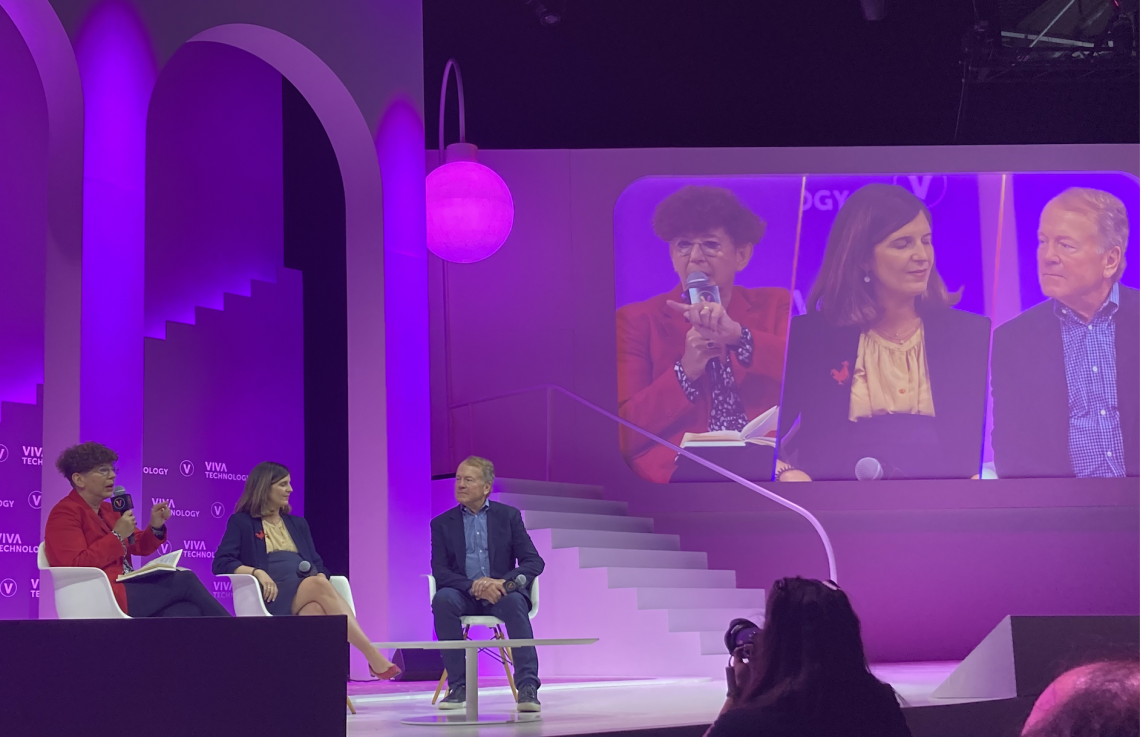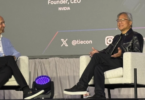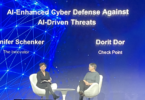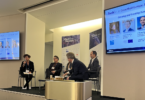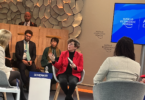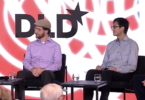Over 90,000 people gathered in Paris this week for VivaTechnology, Europe’s largest tech conference, to learn about cybersecurity, green tech, AI, crypto, the metaverse, the future of work as well as how to scale up the European tech sector during a period of economic turmoil.
Speakers included government officials such as French President Emmanuel Macron, Ukrainian President Volodymyr Zelensky (who appeared live via hologram), and European Commission Vice-President Thierry Breton, well-established tech personalities such as Former Cisco Executive Chairman John Chambers and Former Google CEO and Executive Chairman Eric Schmidt, rising stars such as Ethereum Founder Vitalik Buterin and Binance Founder and CEO Chengpeng Zhao, as well the CEOs of French corporate giants such as LVMH, L’Oreal, Orange and TotalEnergies.
The Innovator’s Editor-in-Chief moderated three sessions at the conference, including one with Chambers and La French Tech Director Clara Chappaz (pictured here).
Read on to get some of the key takeaways from the conference:
STATE OF FRENCH AND EUROPEAN TECH SECTOR
Jennifer L. Schenker, The Innovator’s Editor-in-Chief, moderated a session on opening day on How To Grow, Raise Capital And Surive During Economic Turmoil with Chambers and Clara Chappaz, who worked for startups for ten years and is currently the director of La French Tech, which serves as bridge between the government and startups. (The session is pictured here). To watch the video click here.
On Friday French President Emmanuel Macron entered into an on-stage conversation with some of France’s most successful entrepreneurs. He outlined how far the French tech sector has come in the past six years. He reminded the audience that several years ago he called for the creation of 25 unicorns in France by 2025. There are already 27. Macron said he would like that number to reach 100 in the next five years and hopes that at least a quarter of them are focused on green technologies. He mentioned his plan for 2030 that calls for €30 billion euros to be spent in deep tech areas such as biotech and clean tech, with 50% of those funds earmarked for startups. Macron acknowledged that France needs to train more people for the tech sector and said he was committed to starting training in computer coding to students in junior high school.
CYBERSECURITY
The Innovator’s Editor-in-Chief, also moderated a session on cybersecurity with Olivier Nautet, Head of Cybersecurity and Digital Fraud at BNP Paribas and Zeina Zakhour, Vice-President and Global CTO Cybersecurity at Atos.
The session focused in part on the high cost of cyber attacks and why it is at the top of CEO agendas. Cybersecurity Ventures expects global cybercrime costs to grow by 15% per year over the next few years, reaching $10.5 trillion USD annually by 2025.
The damage cost estimation is based on a dramatic increase in hostile nation-state sponsored and organized crime gang hacking activities, and a cyberattack surface which will be an order of magnitude greater in 2025 than it is today.
Cybercrime costs include damage and destruction of data, stolen money, lost productivity, theft of intellectual property, theft of personal and financial data, embezzlement, fraud, post-attack disruption to the normal course of business, forensic investigation, restoration and deletion of hacked data and systems, and reputational harm.
The panelists said that so far their companies have not experienced attacks directly associated with the war in Ukraine. But both said their companies are on high alert. “What is undeniable is that cyberwar is part of war,” said Zakhour. “You have war on the ground but there is also war [in cyberspace] so you worry you will become collateral damage.”
The panelists addressed the fact that it is no longer enough to protect your own network. Companies have to ensure their suppliers are also secure.
Zakhour urged the startups in the room to factor in security by design when they create new products. Otherwise, she said, “your products can become the weakest link of an organization.” There are two strong incentives. One is that many large corporates are now changing their procurement policies to ensure that security will be added to the products they buy. The second is that Europe is a few months aay from passing a law that will include stipulations about including security into digital products and services. “It is better to start now and implement best practices” and get ahead of the law, she said.
The panelists talked about how technology applied to cybersecurity is a two-edged sword.
AI-powered cybersecurity technology can improve detection and response and predictive maintenance but bad actors are also wielding AI tools to improve methods of breaking into networks.
Both panelists stressed the importance of preparing for the introduction of quantum computing, which will break the encryption methods currently used. Bad actors are stealing data now that they can encrypt later when the tools are available, so the panelists noted that it is important to do an inventory and understand what assets are vulnerable.
There was agreement on the increased need for coordination between companies. Corporates are starting to share information with each other about attacks thanks to entities such as France’s Campus Cyber and the Cybersecurity Initiative Charter of Trust
Nautet talked about how the role of the Chief Information Security Officer (CISO) is changing. When he started his job at BNP Paribas seven years ago his job was very much IT focused. Now, he says the cybersecurity team “is fully involved in business decisions. “Cyber has not only changed IT it has changed business decision making,” he says.
New cybersecurity ambassador roles are being created inside organizations such as chief product security officers and supply chain procedure officers who help support CISOs, says Zakhour. “Today’s cybersecurity specialists need to have both communication skills and technical skills, “ she says Zakhour. “ It requires a unique type of individual.”
The panel touched on the fact that there is a talent shortage in cybersecurity. There are literally tens of thousands of jobs that can’t be filled. There is also a need for more diversity in the sector, which is still heavily dominated by men.
The panelists urged everyone to take cybersecurity seriously as the cost of cyber breaches can take a heavy toll on a corporate’s finances and its reputation.
Says Zakhour: “Don’t think of security as a cost but as something that is creating value for you.,” she says. “This is what your customer expects in the end.”
To watch a video of the session click here.
GREEN TECH
Green tech was a big theme at this year’s VivaTechnology, with sessions covering everything from green hydrogen to fusion. The Innovator’s Editor-in-Chief moderated a session on the Transition To The Circular Economy with Camille Richard, Head of Sustainability at BackMarket, a refurbished gadget marketplace which is now valued at $5.7 billion, Céline Alby, PhD in AI, head of daa scient at Axionable, a B Corp, GreenTech consulting firm helping companies tackle climae change with data and AI, and Ellen Moeller, Head of Europe at Watershed, a company that helps businesses across the world create climate programs, across measurement, target setting, do deep reduction planning, and access carbon removal projects.
Between the COP25 in Paris’, 2015, where the Paris Agreement was signed and COP26 in Glasgow, 2021, 70% more virgin materials were extracted than what the Earth can safely replenish, according to The Circularity Gap Report, an annual document on the state of the circular economy, launched at the World Economic Forum’s Annual Meeting in Davos.
Rising waste levels are accompanying the rapid acceleration of consumption: ultimately, over 90% of all materials extracted and used are wasted. Or, to look at it from another angle, less than 10% make it back into our economy. And it’s getting worse: in only two years, global circularity dropped from 9.1% in 2018 to 8.6% in 2020.
An estimated 70% of all global greenhouse gas emissions are related to material handling and use, so unless we radically transform how we use materials to satisfy our needs, we cannot meaningfully cut emissions. The bottom line is the transition to the circular economy requires that we both reduce waste and cut carbon emissions. The panelists in this session explained how they are tackling both problems.
METAVERSE
Mckinsey released a report at VivaTechnology that predicts annual global spending by businesses and consumers in the metaverse will equal $5 trillion by 2030. Some 95% of executives in McKinsey’s study said they believe the metaverse will have a positive impact on their respective industries in five to 10 years, and 25% said they expect it to drive 15% of their organization’s revenues in five years. While e-commerce and advertising will generate a big chunk of the projected revenues in their presentation at VivaTech McKinsey senior partners Eric Hazan and Lareina Lee stressed that the metaverse is likely to impact all industries, including manufacturing, finance, utilities, and healthcare. Applications include everything from allowing surgeons to map their patients in 3D environments to enabling factory digital twining down to the screw level, virtual R & D collaborations and radical improvements in operational maintenance.
McKinsey urged corporates to start planning and testing their metaverse strategies now. “Set goals, decide what role you want to play, launch initial use cases, define the long-term potential and start sourcing talent,” said Hazan. “The potential is too big to ignore.”
To watch a video of the session click here.
ARTIFICIAL INTELLIGENCE
Former Google CEO and Executive Chairman Eric Schmidt, Meta VP & Chief AI Scientist Yann LeCun and Cedric O, the former Secretary of State for the Digital Sector of France, had an onstage discussion about the state of AI. Lacun dismissed the suggestion of a Google AI engineer this week that the company has created an AI that is conscious. Lacun said he thinks reaching anything close to human intelligence will take 10 years; Schmidt said he thinks it will be more like 2. Schmidt talked about China’s ambitions in AI and deep tech. China wants to be dominant in AI by 2030 so, he said, the West needs to make sure that it wins. Europe is behind both the U.S. and China due to a number of factors, said Schmidt. The Continent has excellent universities but they are not well-funded and are not producing enough software engineers and entrepreneurs. Universities also need to build closer ties to private enterprise, he said, in order to build up the ecosystem.
UKRAINE
Ukrainian president Volodymyr Zelenskyy appeared as a hologram at VivaTechnology ,, where he referenced Star Wars as he called on global tech companies to help rebuild his war-torn country.
“No other country in the world will offer you such a chance to use the most advanced technologies at the state level,” Zelenskyy said.”Ukraine is an opportunity for you”.
Zelenskyy acknowledged that it was “unusual for a president or head of government to speak via hologram”.But “this is not the only element of Star Wars that we will put into practice, we will beat the Empire too,” the former actor said, referring to Russia.
Even amidst the devastation of war, Zelensky said Ukraine continues to develop and pledged to make digital transformation central to his nation’s rebuild.“Our goal is to make Ukraine the freest digital state in the world,” he said, “Ukraine is a chance for a global digital revolution,” he said; “a chance for every technology company and a chance for every visionary to show their value, skills, technologies and ambitions.”
ARHT Media’s holographic technology enabled the President to appear on stage simultaneously at four of Europe’s largest tech festivals: Paris’ Vivatech, Stockholm’s Brilliant Minds, London’s Founders Forum and Amsterdam’s The Next Web.
For more of The Innovator’s Key Takeaways articles click here.

